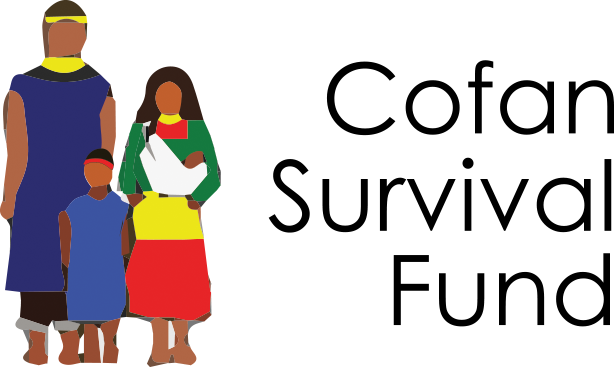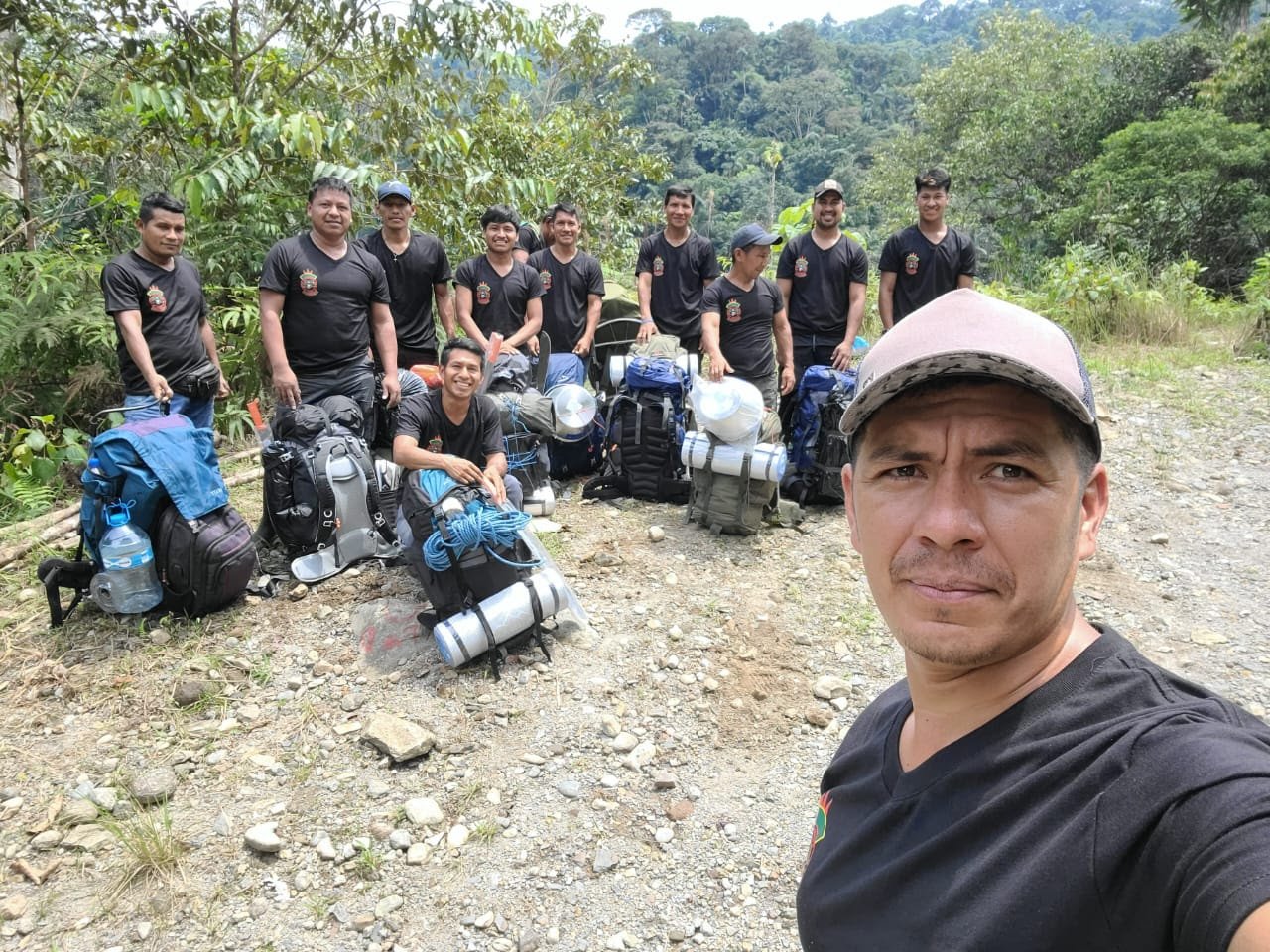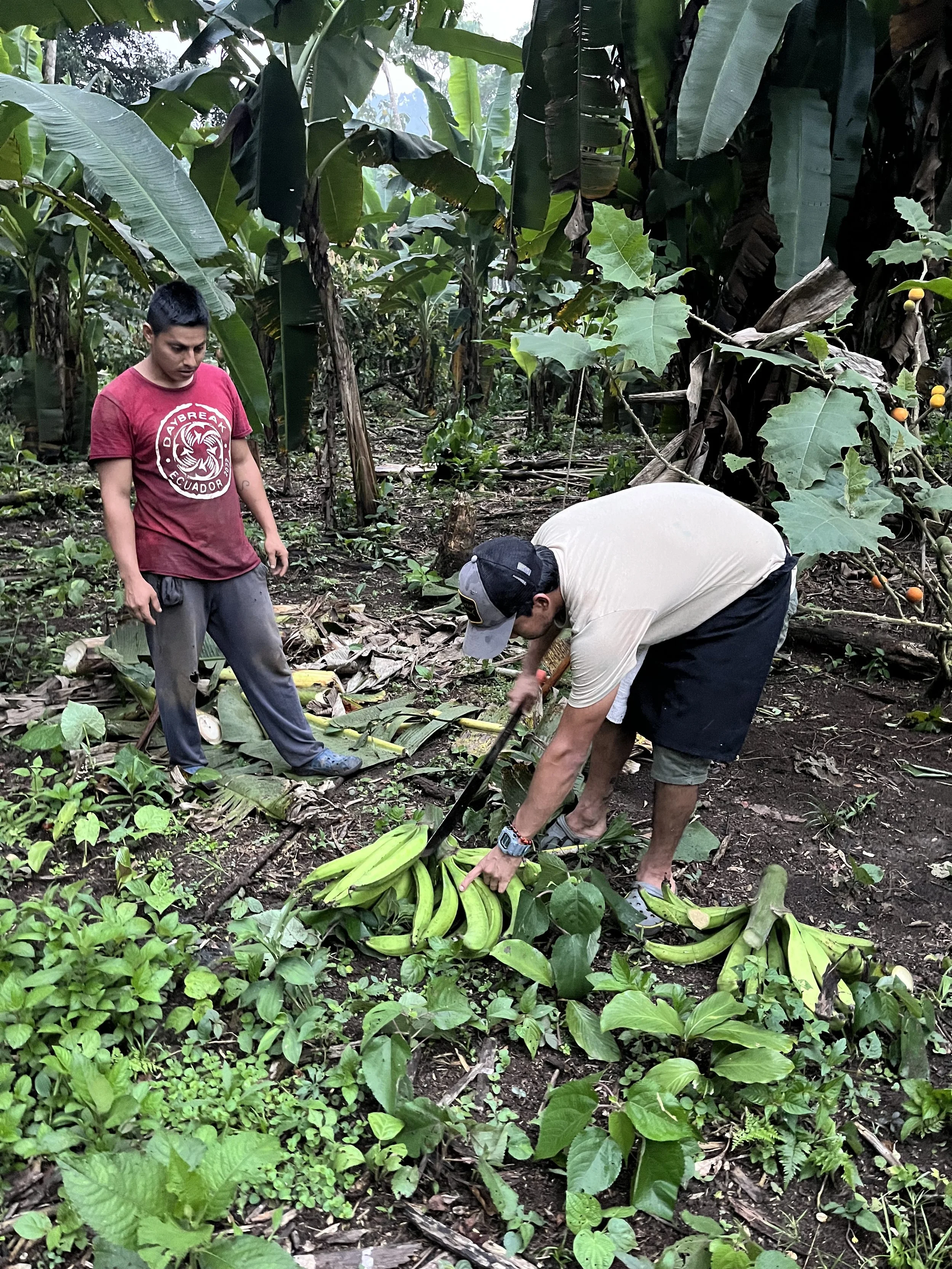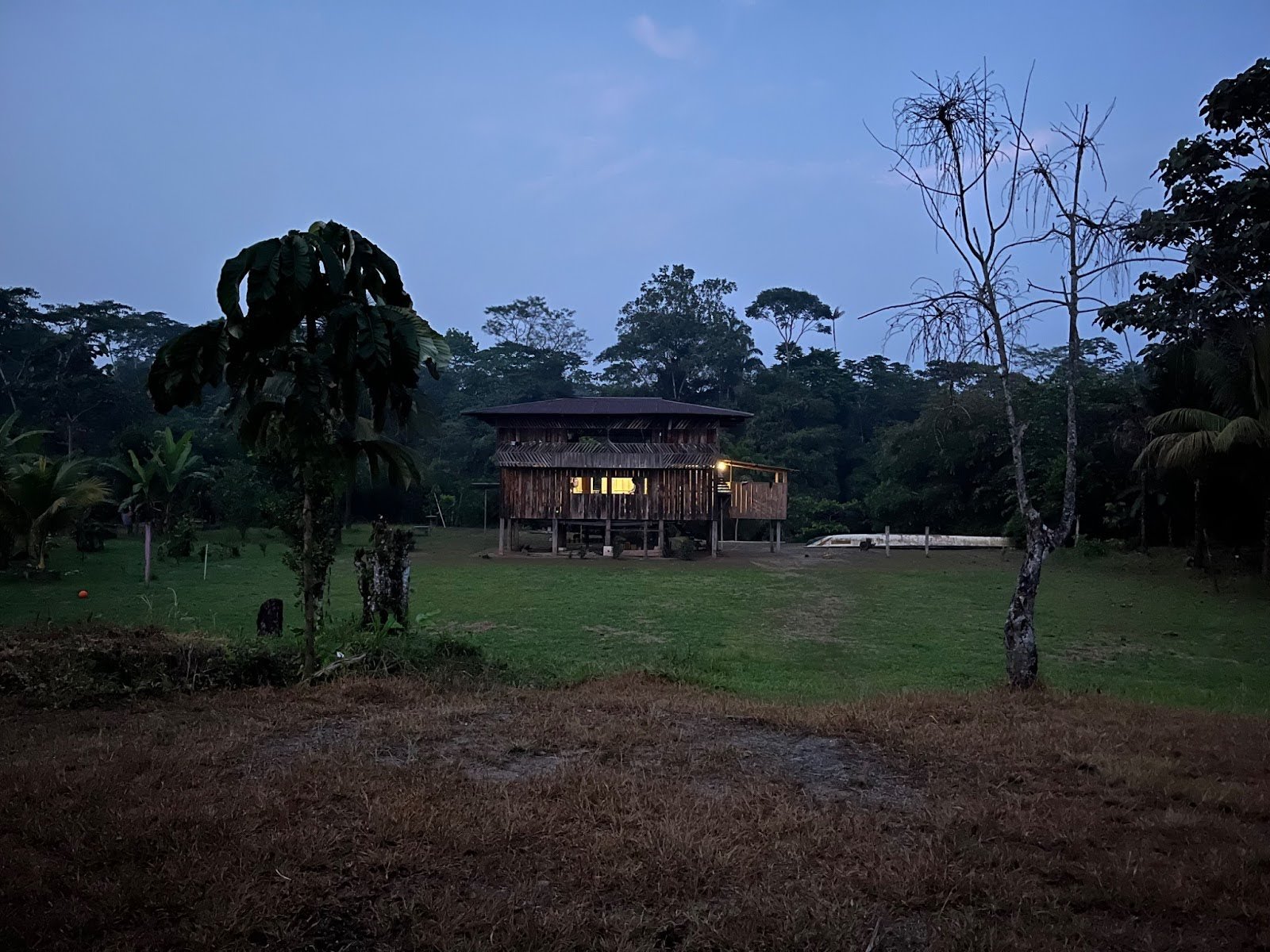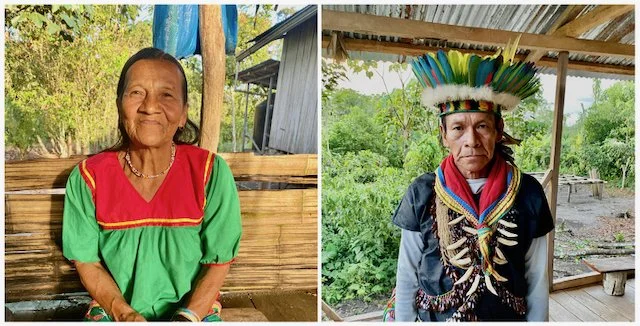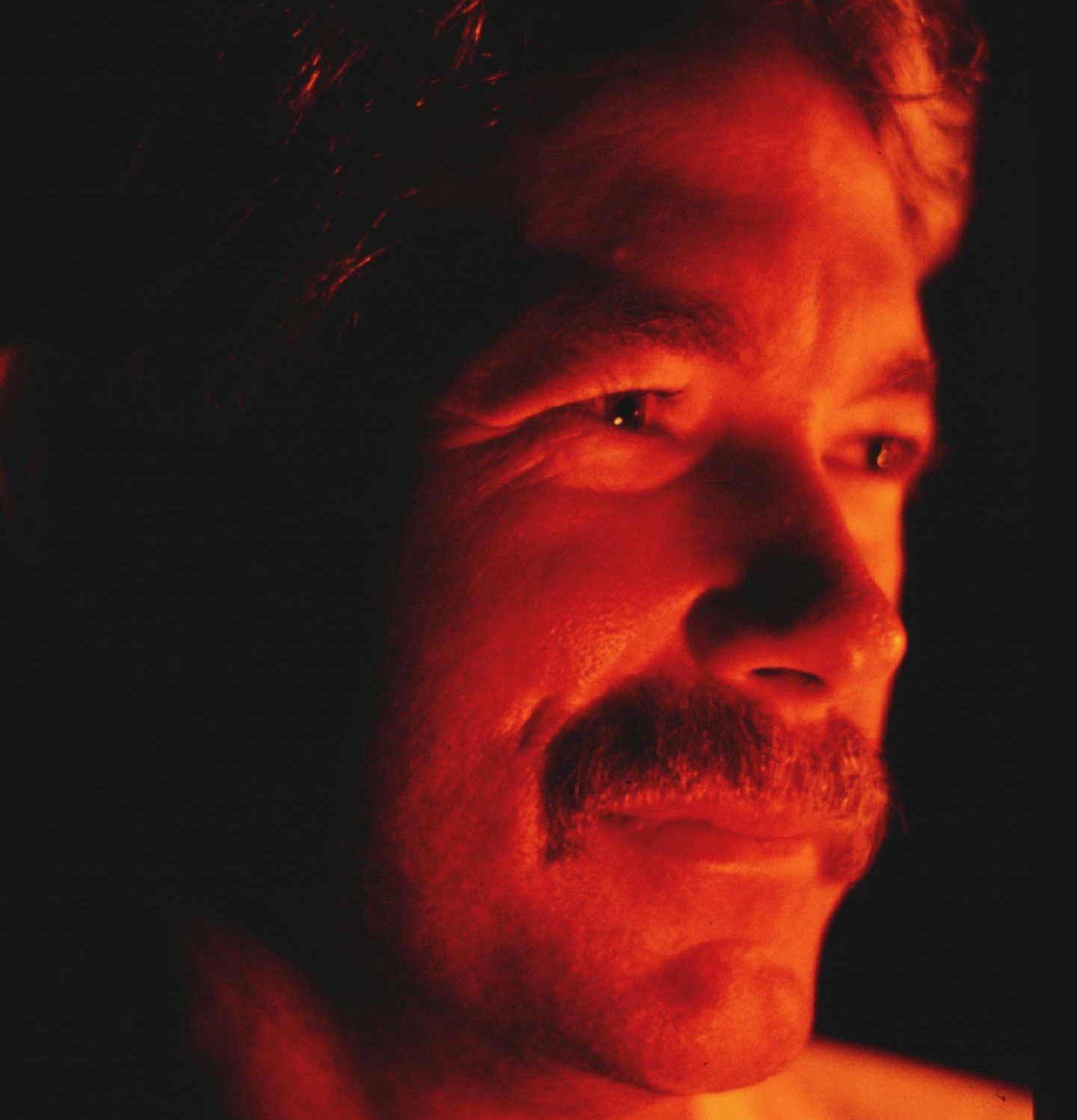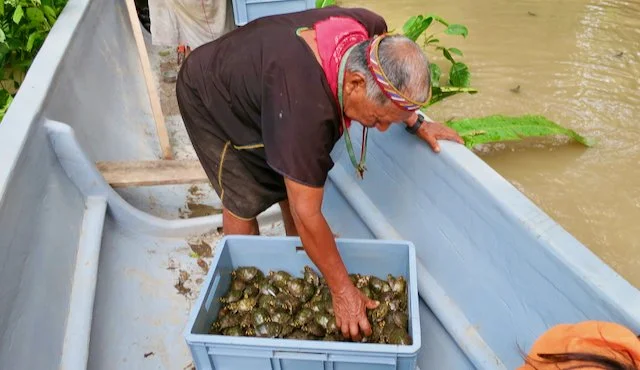Dear Cofán Survival Fund Supporters,
We are always happy to write with good news, and today we are writing to share the ongoing, critical work to reinstate the Cofán Park Guard Program… and how your continued support is driving that success.
While threats to the land increase, so does our ability to meaningfully intervene. Vince McElhinny, CFS Board Member since 2018, brings us this newsletter after speaking with Randy and Felipe Borman about the history and future of the Park Guard Program.
Vince McElhinny is Senior Director of Environmental and Social Accountability in the Global Indigenous Peoples and Local Communities Center at Conservation International.
Cofán Park Guard Program
The Cofán Park Guard Program is the backbone of sovereign control by the Cofán Nation of its 450,000 hectares of intact rainforest. The program represents the unique contribution of the Cofán to preserving the Amazon rainforest in ways that are currently undervalued in economic terms but that are increasingly recognized as essential to conservation success. The Park Guard Program has also been instrumental in strengthening Cofán culture, creating a deep sense of Cofán national identity, and providing a critical source of income and training to Cofán men and women.
Our short-term target for the restoration of the Park Guard Program to its full potential is $200,000 annually for each of the four main Cofánterritories that depend on Park Guard protection. Our medium-term goal is $1,000,000 per year to fully operationalize the Park Guard Program as a centralized force managed by the Cofán Nation through the FSC.
The Cofán Park Guards have provided scientific insight that has illuminated the meaning and value of Amazonian and Andean environments and ensured the health of important ecosystem services. In addition, the Guards have anchored the cultural identity of generations of Cofán men and women. The program has pioneered surveillance, landscape management, and logistics techniques that are cost effective. Indeed, other Indigenous Nations have adopted some of the techniques originally created as part of the Cofán Park Guard Program. The future Park Guard Program will build on these achievements to respond to the combined challenges of climate change, threatened loss of cultural identity, intensified resource extraction, territorial dispossession, and flagging state capacity to enforce land-use norms and laws.
Program History
In response to oil company and settler encroachments in the 1970s, families in different Cofán communities organized into work groups, each spending two weeks per year to clear and guard boundary trails for the Cofán’s first two legalized landholdings: the villages of Dureno and Duvuno. The regular presence of the work groups was fairly effective in deterring the invasion and destruction of Cofán territory.
While the positive impacts of these efforts were clear, the voluntary commitment of multiple weeks per year in the service of protecting Cofánterritories represented significant personal expenses for families. At times, it also placed them at great risk due to confrontations with forest invaders. Dedicating weeks to patrolling land and clearing boundaries meant families could not do the everyday work needed to maintain their livelihoods. In other words, the initial small-scale efforts were not a sustainable solution.
The problem worsened during the 1990s. Legalized Cofán territory grew to include four additional, and much larger, forested areas, putting hundreds of thousands of hectares of forest in the Cofán’s hands. The resulting strain on community patrols became untenable. People did not have the time or resources to take months off from subsistence activities and periodic wage labor to protect what had become an expansive Cofán homeland.
To be sustainable, the Cofán Nation needed to find a way to compensate people for putting their lives on hold so they could dedicate themselves to full-time protection of their land. Otherwise, their families would be left without food and other resources that had become essential to Cofán life in the 21st century.
Expanding the Park Guard Program: A Decade of Success
By the early 2000s, the Cofán had recovered legal rights to over 200,000 hectares of their ancestral homeland. Effectively guarding this extensive territory was something voluntary family work groups could not do. Thanks to the work of the CSF, funding from large institutional donors finally became available to launch a professional Park Guard Program with a full-time presence on Cofán lands. The program trained, equipped, and paid two rotating teams, each with 27 men and women. Each team had two groups: one carried out dispersed, mobile field missions while the other staffed permanent stations at particularly vulnerable access points into Cofán territory. While one team worked, the other team rested. The teams rotated each month.
Each month’s work involved three patrols of five people each who moved from one site to another to maintain boundaries, monitor threats, and confront invaders. The mobile patrols were complemented by six two-person units who managed the permanent stations. At the end of the one-month work periods, the guards returned to the central program office in Lago Agrio, where they wrote reports, picked up paychecks, had debriefing meetings with CSF directors, and then returned to their villages.
The program created a regional awareness of the Cofán’s ability to be present in any corner of their land and to call on the full force of a united CofánNation. This deterrent was particularly apparent to oil and mining companies, to whom the ability of a uniformed group of tough young men and women showing up from the depths of the forest to take pictures and radio in GPS coordinates was extremely intimidating.
Additionally, the guards enjoyed the formal recognition of Ecuador’s Ministry of Environment, giving them full police powers. Rather than directly engage intruders with force, however, the guards typically called in allies from the military or police to deal with potentially violent situations.
Not only successful for minimizing deforestation, the Park Guard Program also served as an important cultural link. The jobs were directly related to the forest environment, which is the foundation of Cofán culture and language. Moreover, the Park Guard Program strengthened a sense of Cofán national identity. The teams and patrols mixed people from different villages. In doing so, they created a sense of common purpose and identity of one nation fighting for one homeland. Previously, community identity was far more important than national identity, including in matters of forest protection.
Each patrol group also had at least one older person. The oldest members shared stories each night when the patrols were preparing to sleep in forest camps. Younger people assimilated this essential cultural knowledge of myth, history, and ecosystem functioning. This intergenerational knowledge and culture transmission formed a group of highly trained and motivated Cofáns. The skills they learned while working as Park Guards led many to assume leadership roles at the community level.
Of the Cofáns who have trained and worked as Park Guards, over a third have been women. Most of these women served as active rangers in the field. In the past, married couples staffed the permanent stations.
Unfortunately, international donor organizations began to withdraw their funding of the Park Guard Program in 2013 due to various changes in the global economy and the conservation funding landscape. Simultaneously, the Ecuadorian government introduced its Socio Bosque Program, a well-intentioned means of providing payments for protecting environmental services to rural peoples such as the Cofán. However, the low, restricted, and unsteady level of Socio Bosque funding made it insufficient for sustaining anything more than minimal ParkGuard activities at the level of individual communities rather than the Cofán Nation as a whole.
Once more, each community faced the task of protecting its territory on its own with limited time and resources. Socio Bosque has kept the Park Guard Program alive in some sections of the Cofánhomeland, but it has not been able to sustain the program at anything close to its previous level of functioning.
The Park Guard Program Today: A Vision for the Future
Felipe Borman now manages the ParkGuard Program in its current form. Felipe has orchestrated the model to optimize available skills and resources, involving a rotation of temporary, community-based guards that work one month on, one month off.
The current work focuses on boundary maintenance and threat engagement in the least protected and most at-risk Cofánterritories. For example, this past spring Felipe led a team of 10 guards that took one month to complete the rehabilitation and maintenance of the boundary trails delimiting the Cofán-Bermejo Ecological Reserve, within which four Cofáncommunities are located. The training component continues to be a galvanizing step in the formation of the Cofán ParkGuards, but as Felipe has observed, training must remain in step with the evolving demands of the work.
Training in basic technology, logistics, and first aid now occurs at the FSC’s Quito headquarters. But as Felipe highlights, the technology needed to protect Cofánterritory is changing. The Cofán need people capable of GIS mapping and analyzing drone imagery. They also must be able to produce data visualizations of emerging threats and achievements. Finally, they must possess the skills and tactical knowledge to engage an ever-more complex social, economic, and political situation in contemporary Ecuador.
To do this work, the CSF has helped secure essential initial investments from the Azimuth World Foundation and the Houser Foundation. With grants from these institutions, Randy and Felipe now know what they must do to bring the Park Guard Program back into full operation.
With ever-increasing threats from mining, logging, commercial hunting and fishing, and the illicit economy in narcotics along Ecuador’s border with Colombia—the heart of Cofán territory—returning the Park Guard Program to full strength is more important than ever.
Support from the Azimuth World Foundation and the Houser Foundation led directly to successful missions in 2023 and 2024 to protect and monitor Cofán boundaries in the most vulnerable parts of their territory.
It was the first time in almost a decade that the Park Guards had visited these areas to make sure they remained protected. Problems and threats exist in all of them, but even the initial Park Guard work has served as a powerful deterrent to forest destroyers. The success of these initial missions is undeniable. Guards reported numerous sightings of and interactions with illegal resource extractors (see photo below of an illegal logging camp.) Simply showing up, explaining who they were, and expressing their determination to protect their land were critical interventions. Once again, the Park Guards have become effective, yet so much more remains to be done.
The recent work of the Park Guards also profited from new mapping and imaging technologies that allowed the teams to work more efficiently, effectively, and safely.
The equipment provided thanks to the generosity of the Azimuth World Foundation and the Houser Foundation has given the Park Guards a more holistic and precise view of what their future work must accomplish.
These two institutional allies have provided essential resources to the Park Guard Program, but the individual contributions of you, our CSF supporters, have also been critical. Without your donations, the guards would have less equipment and less of the political, legal, and logistical oversight that only our Rapid Response Team, led by Randy Borman and our legal specialist Freddy Espinosa, can provide.
Securing Success: Goals for the ParkGuard Program in 2025
Based on lessons we have learned during the Park Guard Program’s 22-year history as well as the recent work supported by the Azimuth World Foundation, the Houser Foundation, and you, we now have a vision of what it will take to make the Park Guard Program the effective institution Cofán territory, and the whole world, need.
Our revamped Park Guard Program would support 60 guards divided into teams that would rotate work each month. The 30-person teams would include three active patrol groups of 5-10 individuals who would clear and maintain territorial boundaries, monitor ecological changes, collect and analyze biocultural data, and head off confrontations with gold miners, drug traffickers, loggers, commercial fishers and hunters, and illegal settlers.
To secure Cofán lands at especially vulnerable, high-friction locations, the guards will also reestablish their system of permanent stations. For both patrol and station work, the guards will need constant access to transportation, field equipment, a communication network, and logistic support to maintain control and integrity of the areas they oversee. The program would involve periodic meetings of the entire guard force with Ministry of Environment officials. Additionally, the 30-person team that is rotating off will meet with and update their incoming counterparts before returning to their communities.
The program would require formalizing and ensuring consistent funding for a team of operational and management support staff that will specialize in spatial analysis, finance/logistics, communications, and funder management.
Our short-term target for the expansion of the Park Guard Program is $200,000 for each of the four main Cofánterritories that depend on its protection: the Río Cofanes Territory, the upper Cayambe-Coca Territory, the Cofán-Bermejo Ecological Reserve, and the portion of the Cuyabeno Wildlife Reserve managed by the community of Zábalo.
Our medium-term goal requires an extra $200,000 to fund our support and management team. With these funds, the total annual cost of a fully functional ParkGuard Program is $1,000,000 per year. As for “in-kind” contributions from the CofánNation, Cofán individuals will be doing extremely arduous and dangerous work that depends entirely on their knowledge of and commitment to the land in question.
We view these funding goals as transitional steps to a more sustainable and permanent income source. Ecuador, like many tropical forest countries, is committed to gaining international investments to support the essential ecological services—including climate-change mitigation—provided by intact ecosystems such as those protected by the Cofán Nation. Access to global carbon and biodiversity funding will require extensive monitoring, reporting, and verification mechanisms. We seek to integrate these mechanisms into the ParkGuard Program, which will make an Indigenous People a direct beneficiary of global conservation funding, a novel yet necessary development.
As carbon and biodiversity funding solutions come online in the near future, we seek bridge funding to ensure that the ParkGuard Program will enjoy long-term financial commitments from the global community. Without this funding, the Cofán Nation will not be able to sustain their long-term commitment to keep their forests standing.
The lands bordering the Cofán's are in many cases severely degraded. It is no mystery why Cofán lands have not suffered the same fate: through individual, community, and nation-wide efforts such as the Park Guard Program, the Cofán have succeeded in protecting lands that others have not, including the Ecuadorian state.
The Cofán Nation now controls approximately 450,000 hectares of the most biodiverse territory in the world, territory that is essential to mitigating climate change. For little more than $2 per hectare, this land can remain intact.
For those who think in terms of acres—each hectare equals two and a half
acres—the Cofán Park Guard Program promises to protect the most ecologically rich and valuable land in existence for less than $1 per acre. After decades of failed conservation schemes at both small and large scales, we believe that funding a proven, Indigenous-managed conservation force at the cost we propose is one of the best bargains imaginable.
Vince McElhinny is Senior Director of Environmental and Social Accountabilityin the Global Indigenous Peoples and Local Communities Center at Conservation International. Vince leads a Global Safeguards Team, providing technical support and oversight to CI project teams and advancing an institution-wide Safeguard System. Vince has over 20 years of experience in environmental and social impact assessment and management, negotiation capacity building, monitoring and evaluation, and policy and program management. He holds a Ph.D. in Political Science and is based in Charlottesville, Virginia and has been a CSF Board member since 2018. All views expressed in this article are those of the author and do not necessarily reflect the policies or opinions of Conservation International.
Our Contact Information
Cofan Survival Fund
53 Washington Boulevard
Oak Park, IL 60302
(331) 218-4246
